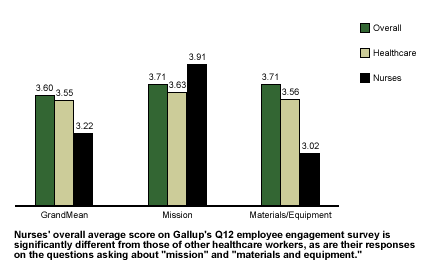This is the first of a two-part column to be continued in next week's Tuesday Briefing.
As discussed in the Feb. 5 edition of Tuesday Briefing, ("Shift Change: Where Did All the Nurses Go?") employee engagement among nurses is crucial to the success of any healthcare facility and is a major factor in controlling nursing turnover. Gallup research has shown that employee engagement is significantly lower among nurses than for the healthcare workforce as a whole.
The question is: When it comes to how they view their jobs, how are nurses different from other healthcare workers, let alone non-healthcare workers? A close look at four key items on Gallup's Q12 employee engagement survey offers some clues.

"The mission or purpose of my organization makes me feel my job is important."
Nurses tend to have an intensely strong sense of mission. Compared to other healthcare and non-healthcare workers, nurses' results are well above average on this item. But that is no cause to ignore it. Rather, their need to see that sense of mission reflected in the hospital's culture should be acknowledged and met.
That's not as easy as it once was. Beginning in the 1970s, federal certificate of need legislation was implemented with the goal of bringing healthcare costs under control by requiring many facilities to justify significant expansion in terms of equipment or services; as a result, healthcare organizations were required to operate more like businesses. The growth of managed care brought tighter cost controls and shorter hospital stays for patients. The intrusion of big business into the patient-care process has the potential to heighten any perceived conflict between nurses' personal senses of mission and the institutional mission as a whole.
"I have the materials and equipment I need to do my work right."
This is one item for which the results clearly separate nurses from other professionals. Their results are significantly lower here than the average among both healthcare workers and the Gallup Q12 database as a whole.
At issue is cost control. In an effort to minimize supply costs, inventory quantities are reduced and supply lists/formularies are restricted. Such strategies, especially when implemented without input from nurses, can evoke negative reactions from them. Gallup research has shown that nurses tend to equate nursing staff shortages with a lack of necessary materials and equipment, so nursing vacancies and turnover are also major factors affecting their engagement scores.
Key Points
Addressing these two items by a) fostering an institutional culture in which employees are constantly reminded of the importance of their work and b) working to ensure that employees aren't constantly frustrated by equipment and personnel shortages may seem like obvious goals for any hospital. But administrators should keep in mind that, amid all the competing priorities present in any modern healthcare environment, for nurses, those are two of the most crucial.
Part II of this column will examine the other two items from Gallup's Q12 survey on which nurses score significantly differently from other healthcare workers.